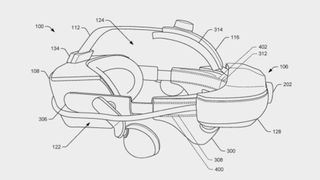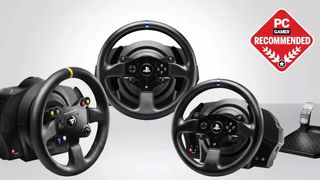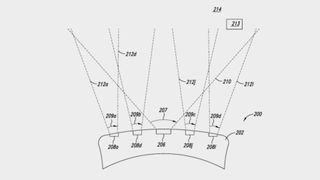A wireless Valve Index with inside-out tracking would be immense, and isn't entirely unrealistic
Wireless Valve Index headset patents spotted with eye tracking.

Spotted this morning, it seems Valve has issued an official patent for a wireless version of the Valve Index VR headset. Not only is this a cable-free design, it also includes eye tracking modules in the blueprints, so we could be in for even more treats should this design actually make it to market. There's even talk of inside-out tracking.

Best PC racing wheels : perfect for any circuit.
Best VR headset: which set is right for trackdays?
The original post on Reddit pulled out some info from one patent, which describes the potential inner workings of the back compartment:
"The back of the HMD may include a compartment having wireless transceivers, a battery, microphones, input/output devices, and/or other components to permit operation of the HMD."
This, coupled with the lack of output wires in any of the draft images, points quite definitively to it being a wireless design. But wont that make the Index much heavier? I hear you cry.
To help bare the extra load, it looks like Valve have jammed a cushioned, adjustable skull brace in there. Just as well, considering these are already the heaviest VR headsets of the lot at 1.79lbs (810g). Any battery that's able deliver the necessary power for long enough to make it worth it will surely add a good bulk of weight.
Still, the Index is one of the comfiest fits around, so you can bet Valve will think to refining the headset's ergonomics if such a design ever makes it to market.


Further to this, the patent mentions eye tracking, in that the design may include "many methods for tracking the eyes of the user." This could involve tracking "up to six degrees of freedom of each eye... to estimate a gaze point."
The biggest gaming news, reviews and hardware deals
Keep up to date with the most important stories and the best deals, as picked by the PC Gamer team.
The same kind of vagaries apply to head tracking details, although another patent has popped up which outlines the potential of headsets with inside-out tracking. Meaning there would be no need for fixed positional tracking devices—the headset would track its own movement, much like the Oculus Quest 2. That also means potentially no more awkward tracker setup.

It's safe to say at this point that this is all speculative. Remember, just because a patent has been issued does not mean it will ever come to market. At least it's some indication that Valve is still determined to make VR an even more immersive and impressive experience.
If these plans do come to fruition, however, it would be a very exciting upgrade for the Valve Index, which already holds a firm place on our list of the best VR headsets.
You can bet it'll involve a good hike in the already premium $1,000 price tag, though.

Screw sports, Katie would rather watch Intel, AMD and Nvidia go at it. Having been obsessed with computers and graphics for three long decades, she took Game Art and Design up to Masters level at uni, and has been rambling about games, tech and science—rather sarcastically—for four years since. She can be found admiring technological advancements, scrambling for scintillating Raspberry Pi projects, preaching cybersecurity awareness, sighing over semiconductors, and gawping at the latest GPU upgrades. Right now she's waiting patiently for her chance to upload her consciousness into the cloud.
Most Popular







